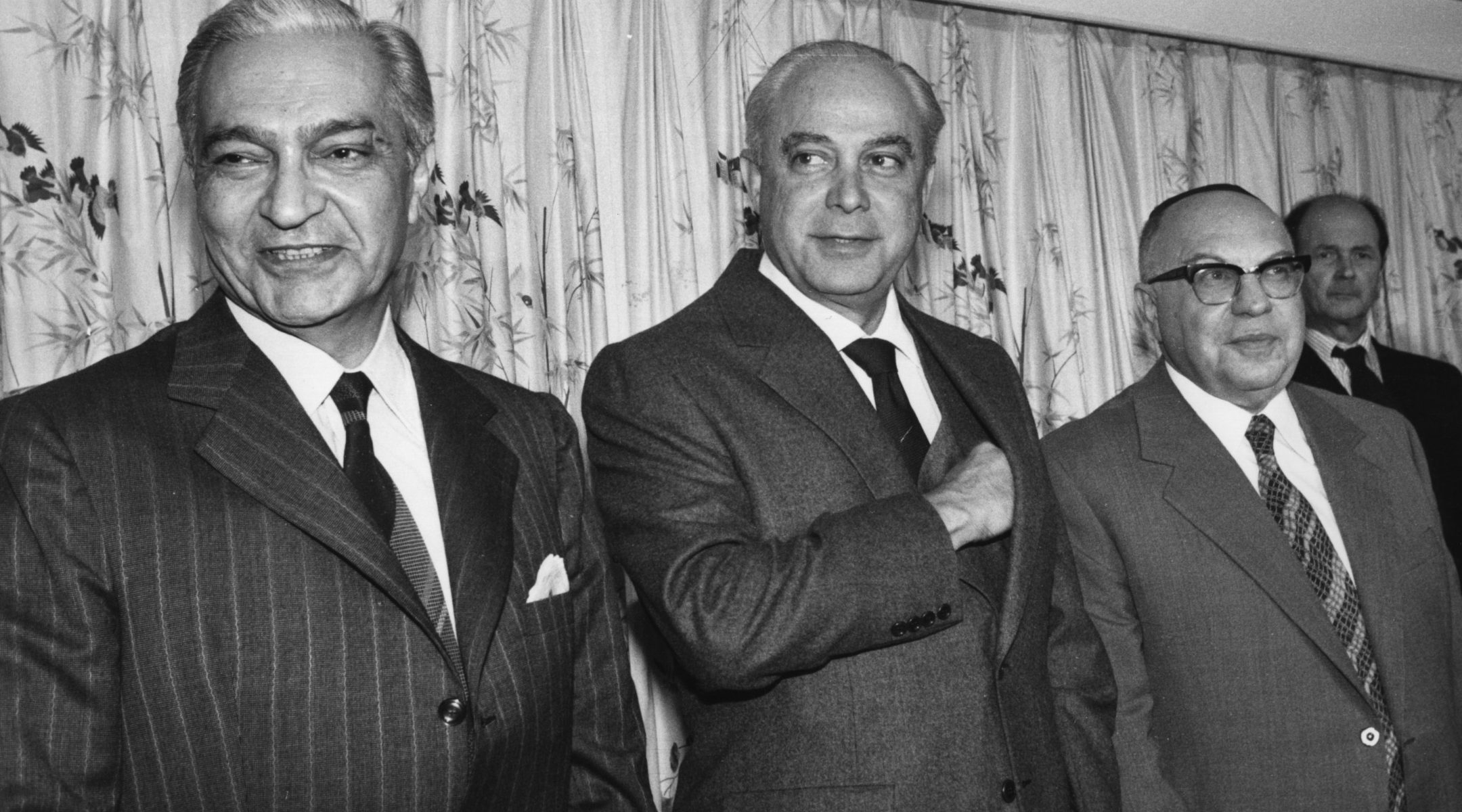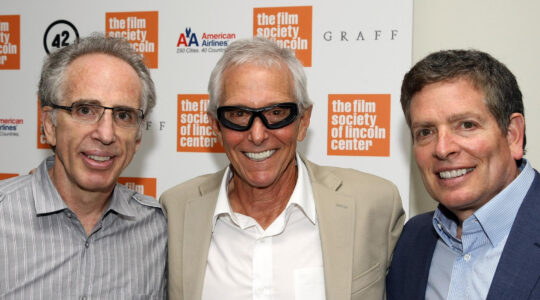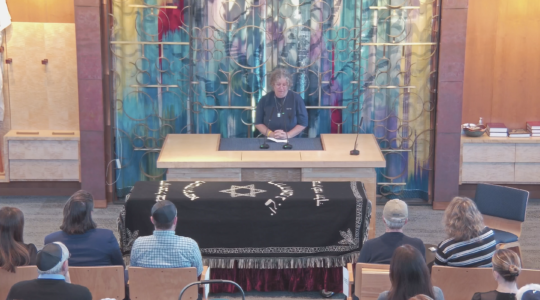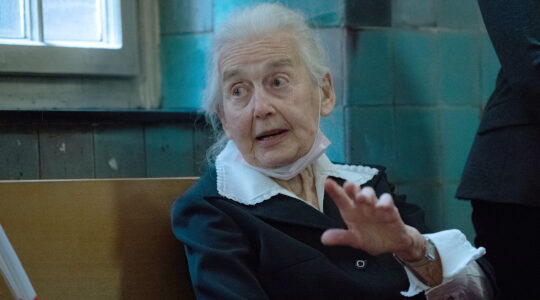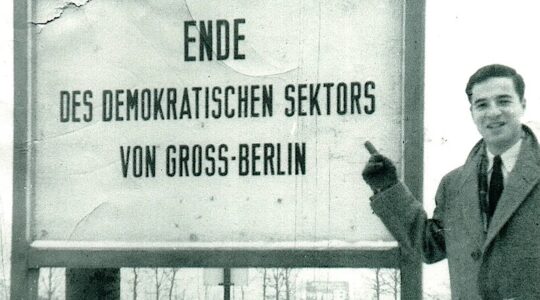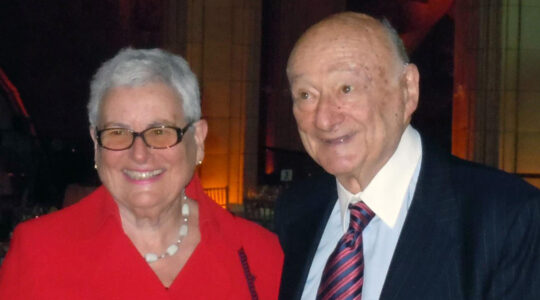
Robert Strauss (center) between Mustafa Khalil, Prime Minister of Egypt, and Dr. Yosef Burg, Israeli Minister of the Interior (Steve Burton/Keystone/Getty Images)
WASHINGTON (JTA) — Robert Strauss, the son of small-town Texas shopkeepers who became an adviser to presidents of both parties, has died.
Strauss, 95, died Wednesday, according to Akin, Gump, Strauss, Hauer & Feld, the energy law firm he helped found in 1945 and which pioneered powerhouse lobbying after its 1971 move to Washington.
Strauss, whose parents ran a general store in Stamford, Texas, north of Abilene, forged his first important political ties at the University of Texas working on the congressional campaign of Lyndon Johnson, a future president, and the student body campaign of John Connally, a future Texas governor.
Connally’s sponsorship decades later led to Strauss becoming chairman of the Democratic National Committee after the party’s presidential candidate, George McGovern, suffered a crushing defeat in 1972.
Strauss led the rebuilding of the party and started advocating on behalf of the little-known governor of Georgia as a possible candidate — a bet that paid off in 1976 with Jimmy Carter’s election as president.
Carter made Strauss a trade envoy and later named him a special ambassador so he could help negotiate the emerging Egypt-Israel peace agreement. Strauss was among Carter’s advisers who successfully counseled the president to resist bringing the Palestine Liberation Organization into the process until it recognized Israel.
Strauss also endeavored to smooth relations between the Jewish and black communities after Carter fired Andrew Young, the U.S. envoy to the United Nations, for meeting with PLO officials.
Strauss, like so many top Jewish officials before and after him, was his administration’s unofficial liaison to the Jewish community — a role he did not appear to always relish, storming out of one particularly testy meeting with Jewish leaders over Carter’s peace process policies in 1980.
After Carter’s inauguration in 1977 and his naming Strauss as a trade envoy, JTA asked Strauss whether Carter would preserve Jackson-Vanik, the legislation linking human rights performance to trade status that was considered critical to liberalizing exits for Jews from the Soviet Union.
The Nixon and Ford administrations had fiercely resisted the legislation — Henry Kissinger, the Jewish secretary of state, was especially contemptuous of it — but Carter would go on to embrace it, one of the rare high points in his relationship with the Jewish community.
In his 1977 JTA interview, Strauss was noncommittal, however, and felt it necessary to explain to a Jewish news agency how being in government necessarily changed his perspective.
“I could have emotional and historical views and the prejudices from that,” he said. “Now, with my present responsibilities, I must be absolutely certain that I am looking at it [Jackson-Vanik] from the standpoint of the whole America. I will take a purely critical and analytical look and I will speak out when I have the authority.”
Strauss said he suffered little anti-Semitism growing up in Texas, saying that he only thought about being Jewish when his parents kept him home on Yom Kippur.
He joined the Baptist Young People’s Union to meet girls, he told the Dallas Morning News in a 1981 interview, and was elected its president.
“Of course, the preacher had to put a stop to that because I wasn’t a member of that church,” Strauss said.
Within weeks of Carter’s defeat in 1980, Strauss — who had chaired Carter’s campaign — began to meet routinely with President-elect Ronald Reagan and became an adviser to him.
Reagan awarded Strauss the Medal of Freedom in 1981, and his vice president and successor, President George H. W. Bush, named him ambassador to the collapsing Soviet Union in 1991, which led to Strauss becoming the first U.S. envoy to the post-Soviet Russia.
Once it became clear in the 1980s — with credible female and African-American runs for the president and vice president – that presidents no longer had to be white, Christian and male, pundits often would turn to Strauss and ask him to name the first likely Jewish president. He invariably would offer himself.
The self-promotion ostensibly was in jest — Strauss liked to remind people that his mother expected him to become the first Jewish governor of Texas — until it wasn’t. Jack Germond, the political columnist, once recalled trying to talk Strauss out of a presidential run in 1983.
“He was a Jew from Texas and a lawyer and businessman who had made a lot of money in ways that might have to be defended,” Germond said in a 2005 Washingtonian magazine article cited in Strauss’ Washington Post obituary. “Above all, he had a wise mouth that no candidacy could survive in this age of political correctness.”
President Obama in a statement lauded Strauss’ appeal across the spectrum.
“Bob was one of the greatest leaders the Democratic Party ever had, yet presidents of both parties relied on his advice, his instincts, and his passion for public service — not to mention his well-honed sense of humor,” he said.
Strauss’ wife, Helen, died in 2006. Strauss is survived by two sons, a daughter and seven grandchildren, The New York Times reported.
JTA has documented Jewish history in real-time for over a century. Keep our journalism strong by joining us in supporting independent, award-winning reporting.
